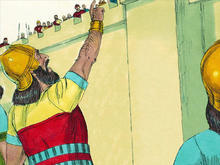Nebuchadnezzar’s second attack on Jerusalem
By Mark Morgan | Jeremiah

Before we look specifically at Nebuchadnezzar’s second attack on Jerusalem, let’s remember that King Nebuchadnezzar of Babylon attacked Jerusalem three times:
On the first two occasions, Nebuchadnezzar took prisoners and reduced the ability of the nation to defend itself.
In this article, we are looking at Nebuchadnezzar’s second attack on Jerusalem. Jehoiakim was king at this time, but he died at some time during the invasion (see “How did he die?”). Jeconiah, his son (also known as Jehoiachin or Coniah), replaced him as king and reigned in Jerusalem for 3 months and 10 days – all of it spent under siege.
When Jeconiah surrendered to Nebuchadnezzar during the eighth year of Nebuchadnezzar,[6] 10,000 people were taken into captivity. 2 Kings 24:14-16 and Jeremiah 24:1 give us descriptions and categories:
Since the components with numbers only add up to 8,000, and some of the categories have no numbers given, it seems likely that the 10,000 only includes the numbers of men. Women and children were probably additional, making a total of something between 30,000 and 50,000 or even more. Not many people were killed – or so it appears. It is possible that Daniel, working for Nebuchadnezzar in far-off Babylon, may have had some influence over that.
According to Jeremiah 52:28, 3,023 Judeans were taken away in the seventh year of Nebuchadnezzar. Perhaps these were people from outside the city of Jerusalem, taken away before Jeconiah gave up.
Only the poorest people remained, a phrase repeated 11 years later, after the destruction of Jerusalem described in 2 Kings 25:12, Jeremiah 40:7 and 52:16. Many even of the poorest were taken into captivity after that destruction.[7]
Sometimes it is interesting to look at events from the point of view of God’s prophets. God seems to have given them some information about the future, but often just snippets, rather than a detailed picture of events with times and order.
This raises the question: When Nebuchadnezzar besieged Jerusalem in the time of Jeconiah, did Jeremiah expect it to be destroyed ?
From the very start of his mission and throughout the years that followed, God gave Jeremiah many prophecies of the destruction coming on Jerusalem. Here are a few examples that refer to the land, the cities and the temple. I believe that they were all given before the reign of Jeconiah:
So when did Jeremiah expect these prophecies to be fulfilled? It seems most likely to me that he would have felt much the same as many people do now in expecting the return of Jesus very soon. In the reign of Josiah, he may have hoped that God would relent, but from then on he would have expected the devastating judgement to come very soon. Every year that passed would probably have been an unexpected delay.
In the reign of Jeconiah, when Nebuchadnezzar’s army was camped outside the walls, I think that Jeremiah probably expected the prophecies of complete destruction to be fulfilled immediately.
As a result, when Jeconiah surrendered, I imagine that Jeremiah would have expected death and destruction on a grand scale – but it did not happen; not then.
God’s timing is not like ours.
See also Sieges.
This article “Nebuchadnezzar’s second attack on Jerusalem” is one of a series of articles on Jeremiah published as back-up material for the Bible-based fiction series Terror on Every Side!
[ More information | Purchase ]
Subscribe to our newsletter
Enjoyed this article? Articles on this site summarise the research we do in writing our Bible-based fiction. If you enjoy reading real Bible-based fiction or are willing to give it a try, enter your name and email address in the fields below, then click "Subscribe". You'll get a new micro-tale, or an informative article every week, as well as occasional special offers from Bible Tales Online. You can unsubscribe at any time.
See our Privacy Policy.